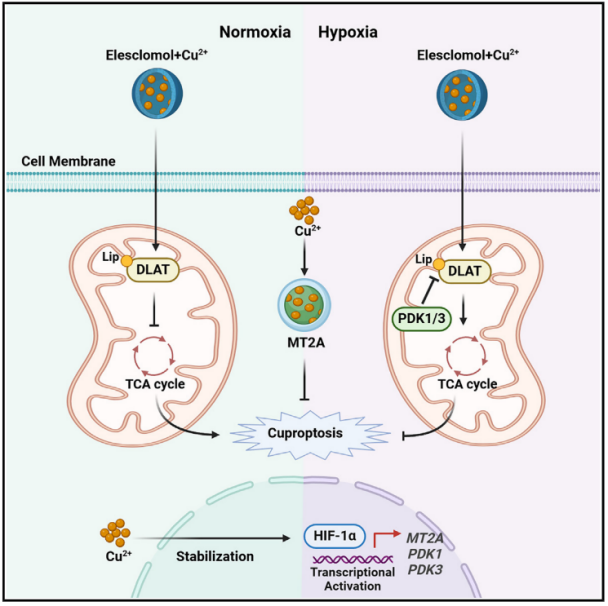Recently, a research team led by Associate Professor Bing Yao from the School of Basic Medical Sciences at Nanjing Medical University published a groundbreaking study in Cancer Cell, a prestigious oncology journal, titled "Hypoxia-Inducible Factor-1α Drives Cancer Resistance to Cuproptosis". This study reveals the critical mechanism by which HIF-1α suppresses cuproptosis through regulating the PDK1/3-DLAT pathway and MT2A expression. The team proposes a novel therapeutic strategy that combines HIF-1α inhibitors with copper ions/ionophores for treating solid tumors. This approach has demonstrated significant efficacy in multiple orthotopic tumor models, offering new insights for clinical translation.

Cuproptosis, a newly identified form of cell death, is characterized by copper ionophores facilitating intracellular copper influx, leading to the abnormal aggregation of lipoylated proteins, disruption of iron-sulfur cluster proteins involved in mitochondrial respiration, and protein toxicity-related stress responses, ultimately resulting in cell death. As an emerging mode of cell death, cuproptosis holds great promise for cancer therapy. However, solid tumors exhibit inerent resistance to cuprotosis, limiting its clinical application.
In this study, Yao’s team uncovered a novel mechanism by which HIF-1α induced cuproptosis resistance in solid tumor cells. They identified MT2A, a copper-storage protein upregulated by HIF-1α, as a key player in this process. .MT2A acted in the cytoplasm to store free copper ions, offering a new perspective for cuproptosis research. Additionally, the team discovered that copper ions could stabilize HIF-1α expression, which in turn upregulated PDK, leading to the suppression of DLAT, a key target of copper. This prevented copper from binding to lipoylated DLAT, further enhancing HIF-1α-mediated resistance to cuproptosis.
Notably, the HIF-1α inhibitor PX-478 effectively sensitized solid tumors to cuproptosis, exhibiting strong therapeutic efficacy in multiple orthotopic models. The combination of PX-478 with copper ions/ionophores not only significantly inhibited tumor growth in mice but also caused no detectable organ damage or significant weight loss, highlighting its potential as a highly effective and low toxicity anticancer strategy with promising clinical applications.

Associate Professor Bing Yao, Professor Yun Chen (NMU), Professor Chao Qin (The First Affiliated Hospital of NMU), and Professors Jun Xiang, Xiang Zhou, and Yu Wang (Fudan University) served as co-corresponding authors. This study was funded by the National Natural Science Foundation of China, the Natural Science Foundation of Jiangsu Province, and the Major Research Project of Taizhou Clinical Medical School.
Feng Huang (Class of 2019 undergraduate) and Jingwan Zhou (Class of 2020 undergraduate) from the School of Basic Medical Sciences contributed as co-authors. In recent years, the School of Basic Medical Sciences has implemented the "Shilu Program" to foster undergraduate innovation and interdisciplinary development. By integrating foundational scientific training with hands-on experimental skills, the program has significantly enhanced students’ research capabilities and educational quality, fostering the synergy between academic excellence and innovation.
(Drafted by Yao Bing’s research team; Reviewed by Chen Feng and Wang Juejin; Translation revised by Zhang Bei)



